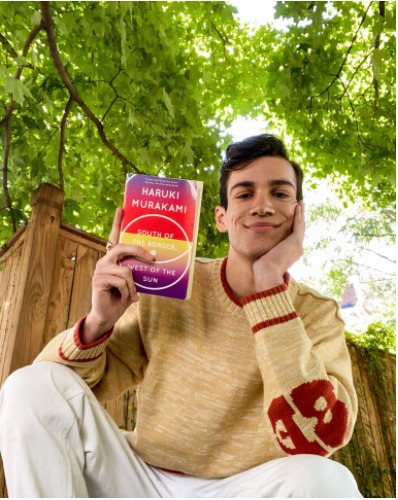Murakami’s book details importance of communication
4 min read
“South of the Border West of the Sun” is a book that touches on how we expect people to treat us, and how we treat others. Matthew Simmons / The Blue & Gray Press
by MATTHEW SIMMONS
Senior Writer
Due to editor error, a previous headline of this article misspelled Murakami’s name.
As the first semester of my senior year continues to progress, so does the amount of work it demands. When thinking about the next book I wanted to read, I aimed to make sure it was a good one, because sometimes you end up with the complete opposite of what you were looking for. With this in mind, I decided to choose from a handful of titles that I read some years ago. I did this to guarantee that it would serve as a pleasant break rather than some sort of obligatory chore.
I must be honest with you in saying that it ended up being an easy choice. I knew right from the beginning that I would be getting my hands back on “South of The Border West of The Sun” by Haruki Murakami. For years now, Murakami has entranced me with the works of fiction and dreamlike descriptions that he weaves throughout his entire portfolio. This time, I chose one of his contemporary fiction pieces. Since it has been a while, I did not remember all the details, which made it all the better. Upon finishing a second time, I would still recommend this book to anyone, and I actively do. It is always the first book that I tell people when I’m asked what they should check out next.
As someone who enjoys a character-driven novel, I relished the pleasure of watching the main character, Hajime, grow from a young 12-year-old to a full-grown adult. What I like about contemporary fiction is its relativity to everyday and sometimes monotonous life. I find that this genre of literature has a way of hitting home emotionally, as we can all imagine plotlines like the ones we see in Murakami’s coming to life. However, this contemporary novel was not painted with monotony, but rather vivid imagery that put words to thoughts and feelings that I have never been able to describe prior.
As an adult, Hajime is living a relatively regular life with a wife and child, all while boasting successful ownership of a jazz-themed bar. However, one evening an old friend stops by for a drink. Within an instant, this woman from Hajime’s past, with whom he is still in love, turns his life completely upside down. Her sudden arrival forms a whirlpool that begins to suck everything that Hajime once knew down into its core.
As stated before, this is not your typical dystopian reality or a sci-fi plot. It does not expand beyond the boundaries of what human imagination can be. Rather, “South of The Border West of The Sun” focuses on something closer to home – the treatment we expect to give and receive from those we love.
Murakami has an innate ability to grab the reader and not let them go until the last page has been turned and the cover has been closed. He writes about small encounters in great detail, allowing the reader to become fully invested in not only the story or lesson being shared, but also the characters that serve as the book’s driving force. I felt like I was on this journey with Hajime side-by-side and, at some points, felt like we had merged into one.
Although subtle, this work of fiction forced me to acknowledge my intentions and actions regarding other people. Themes of misunderstanding and faulty communication were present throughout. Lessons regarding trusting your gut and avoiding the inevitable guilt that follows it are all wrapped carefully within Murakami’s narration. I say all of this in a good way. It was refreshing to see myself within a character that I felt understood where I was coming from. More than anything, this book made me realize how neglectful we can be to others within romantic relationships as well as friendships. We tend to place a lot of emphasis on the mistreatment we are facing from others. Rarely do we take the time to consider whether or not we are doing the same thing to someone else.
This lesson carried itself right through the last sentence, where I was immediately left feeling neither happy nor sad. Content does not begin to explain what I had been feeling emotionally for the week following. This book leaves you trying to piece together every encounter between characters, hoping that if you theorize enough, something may eventually make sense. That, however, is the charm of “South of the Border West of The Sun.” Maybe it is not trying to share a lesson or tell us something that readers do not already know. Maybe, it is just the opposite: that life is deeply complex, triumphant and, at times, difficult beyond words, and by trying to come up with a reason why this is, we can hope to find some sort of peace with our lack of control over it.











